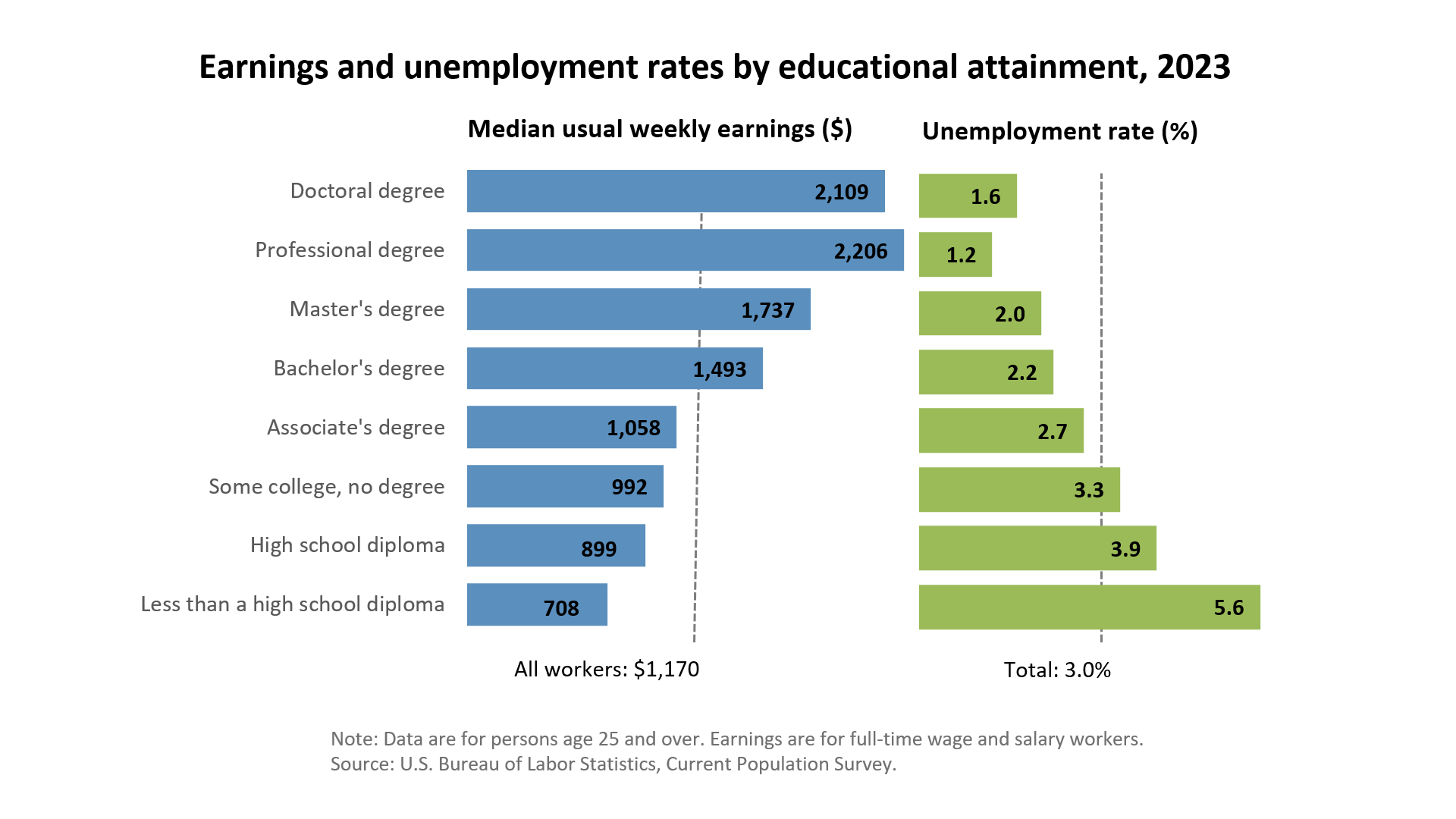The state of New Mexico is home to a diverse population and a low cost of living. Here, you'll find large, research universities like the University of New Mexico, as well as more specialized schools like St. Johns College, a private liberal arts school or New Mexico Institute of Mining and Technology.
That said, the state offers fewer in-person options for student residents, compared to states like New Jersey or California. As such, they've presented an alternative solution that opens up a few more possibilities. New Mexico is also part of an exchange program called the Western Interstate Commission for Higher Education (WICHE).
What this means is, the state provides a long list of benefits to distance learners from other states included in the program, including reduced tuition rates and interstate reciprocity—which gives students the ability to enroll in out-of-state programs without increasing their costs.
That's not to say that New Mexico doesn't have quality schools.

How Much Can You Make by Earning a Degree in New Mexico?
The median household income in New Mexico is $60,980, and the state economy employs about 845,500 people. The top employers are the forestry industry and the US Air Force, followed by education, food services, and construction.
According to the state census, as of 2021, roughly 28% of working adults had received a bachelor’s degree or higher, while 85% has received a high school diploma or GED. Earning a degree in New Mexico can ensure that you receive a higher than average income—especially if you go into nursing, technology, or business administration.
According to the Bureau of Labor Statistics data, a bachelor of science holder earns about $65,000 per year, while the average earnings for graduates with a bachelor of arts is roughly $55,000. Earning a master’s can help increase your earning potential, though a Master of Science ($90k on average) will pay off more than going for your Master of Arts.
The highest paying industries are aerospace manufacturing, aluminum production, and computer equipment manufacturing, so New Mexico residents looking to secure a job in one of these areas may want to look into studying business management, supply chain operations, or engineering. While vocational training may present a faster path to working in manufacturing production, a bachelor's degree is a more versatile credential.
Education Level & National Average Median Compensation
| NO FORMAL EDUCATION | HIGH SCHOOL DIPLOMA | ASSOCIATE DEGREE | BACHELOR’S DEGREE | MASTER’S DEGREE | DOCTORAL DEGREE |
|---|---|---|---|---|---|
| $36,816* | $46,748* | $55,016* | $77,636* | $90,324* | $109,668* |
Featured Online Programs
Most Popular Degrees and Careers in New Mexico
As mentioned in the previous section, the employment trends in New Mexico look a lot like the employment trends we’ve seen in other states and the nation at large. According to the most recent New Mexico Workforce Connection report, the fastest growing industries in the state are leisure and hospitality, sometimes called ‘service-providing’. Service-providing jobs span a wide array of work; they include accountants, marketers, attorneys, consultants, designers, developers, and more.
Unfortunately, the unemployment rate is on the rise, up to 4.7% as of this last quarter. On the whole, jobs in demand tend to lean more toward those with high turnover rates. Servers, janitorial staff, food prep, and fast food workers top the occupation list. For those jobs that require some additional training or a bachelor’s degree, general and operations managers are up there, as are several positions that fall under the healthcare umbrella.
Most notably, the demand for personal care aides is exponentially higher than any other job on this list. Still, workers in that role won’t see huge paychecks. To become a health aide, you’ll need some vocational training or an associate degree—but you might want to look into nursing, as you can earn a healthy paycheck and enjoy a great deal of job security.
While most of the jobs on the top occupations list don’t require much in the way of higher education, New Mexico residents with a degree will have more options available than their peers who do not obtain a bachelor’s degree or higher.
Top Business Careers and Salaries
| CAREER NAME | CURRENTLY EMPLOYED | AVERAGE ANNUAL WAGE |
|---|---|---|
| Compliance Analyst | 1,550 | $58,600 |
| Financial Analyst | 1,870 | $61,500 |
| Financial Controller | 2,090 | $84,800 |
| Financial Manager | 2,090 | $92,600 |
| General Accountant | 5,950 | $52,800 |
| Human Resources Manager | 440 | $68,100 |
| Internal Auditor | 5,950 | $59,300 |
| Management Consultant | 3,180 | $87,800 |
| Operations Manager | 14,730 | $66,200 |
| Sales Manager | 1,130 | $61,600 |
- Accounting
- Business
- Business Administrator
- Business Manager
- Compliance Analyst
- Economist
- Entrepreneur
- Financial Analyst
- Financial Controller
- Financial Manager
- Hospitality Manager
- Human Resources Manager
- Internal Auditor
- International Business Manager
- Management Consultant
- Marketing Manager
- Operations Manager
- Organizational Leader
- Project Manager
- Sales Manager
- Supply Chain Manager
Top Computers Careers and Salaries
| CAREER NAME | CURRENTLY EMPLOYED | AVERAGE ANNUAL WAGE |
|---|---|---|
| Computer Systems Analyst | 1,590 | $70,000 |
| Data Architect | 560 | $119,400 |
| Hardware Engineer | 67,880 | $87,700 |
| Network Administrator | 1,670 | $60,300 |
- Computer Engineer
- Computer Information Technologist
- Computer Programmer
- Computer Scientist
- Cybersecurity
- Data Architect
- Database Administrator
- Database Management
- Hardware Engineer
- Network Administrator
- Software Engineer
- Web Development
Top Education Careers and Salaries
- Early Childhood Administrator
- Early Childhood Education Teacher
- General Education Teacher
- Secondary School Teacher
Top Healthcare Careers and Salaries
| CAREER NAME | CURRENTLY EMPLOYED | AVERAGE ANNUAL WAGE |
|---|---|---|
| Licensed Practical Nurse | 2,120 | $45,300 |
| Nurse Practitioner | 1,110 | $97,600 |
| Registered Nurse | 17,350 | $65,500 |
- Gerontology Nurse or Physician
- Healthcare Administrator
- Healthcare Manager
- Licensed Practical Nurse
- Nurse
- Nurse Practitioner
- Registered Nurse
Top Legal Careers and Salaries
Top Occupations With the Highest Forecasted Growth Rate
These days, service-based careers are among the top growing occupations in New Mexico. As we’ve seen across the nation, nurse practitioners, physical therapists, and home healthcare aides are among the fastest growing occupations in the state.
Nursing is always a good bet for those seeking a decent salary and steady employment, though becoming a medical assistant or home healthcare worker may serve as a stepping stone for those who lack the funds or the time to pursue full-time education.
Looking beyond the healthcare industry, New Mexico’s top jobs are surprisingly diverse. Jobs like electrician and industrial mechanic are on the growth trajectory, as are roles within marketing and technology.
It’s important to note that pursuing the fastest growing jobs out there doesn’t necessarily mean you’re looking at high earning potential. Home health aides and medical assistants aren’t likely to break the $20 an hour mark. However, those requiring a bachelor’s degree—nursing, physical therapy, anything STEM—will set you up for a stable career with an above-average salary.
- Nurse Practitioner: 34.69%
- Physician Assistant: 33.4%
- Physical Therapist Assistants: 31.48%
- Home Health Aides: 30.77%
- Operations Research Analysts: 26.14%
- Diagnostic Medical Sonographers: 25.90%
- Web Developers: 25.59%
- Physical Therapists: 25.43%
- Brickmasons and Blockmasons: 24.84%
Top 15 Best Associate Degree Programs in New Mexico
Northern New Mexico College
Score: 84.29
- Undergraduate Tuition
- In-State: $6,400
- Out-of-State:$14,328
- Net Price: $6,102
- Acceptance Rate: 100%
- Retention Rate: 61%
- Graduation Rate: 33%
- Total Enrollment: 1,310
- Undergrad Students: 1,310
- Graduate Students: N/A
- Grads Salary: $39,100
- Student-to-faculty: 11:1
San Juan College
Score: 79.37
- Undergraduate Tuition
- In-State: $1,790
- Out-of-State:$4,985
- Net Price: $6,288
- Acceptance Rate: 100%
- Retention Rate: 62%
- Graduation Rate: 31%
- Total Enrollment: 6,196
- Undergrad Students: 6,196
- Graduate Students: N/A
- Grads Salary: $35,700
- Student-to-faculty: 12:1
University of New Mexico-Gallup
Score: 78.74
- Undergraduate Tuition
- In-State: $2,575
- Out-of-State:$4,843
- Net Price: $4,750
- Acceptance Rate: 100%
- Retention Rate: 56%
- Graduation Rate: 19%
- Total Enrollment: 1,677
- Undergrad Students: 1,677
- Graduate Students: N/A
- Grads Salary: $37,900
- Student-to-faculty: 13:1
Central New Mexico Community College
Score: 78.15
- Undergraduate Tuition
- In-State: $1,934
- Out-of-State:$8,366
- Net Price: $4,961
- Acceptance Rate: 100%
- Retention Rate: 65%
- Graduation Rate: 29%
- Total Enrollment: 19,067
- Undergrad Students: 19,067
- Graduate Students: N/A
- Grads Salary: $34,500
- Student-to-faculty: 21:1
Eastern New Mexico University-Roswell
Score: 76.36
- Undergraduate Tuition
- In-State: $2,424
- Out-of-State:$5,616
- Net Price: $6,635
- Acceptance Rate: 100%
- Retention Rate: 50%
- Graduation Rate: 28%
- Total Enrollment: 2,044
- Undergrad Students: 2,044
- Graduate Students: N/A
- Grads Salary: $38,000
- Student-to-faculty: 18:1
Eastern New Mexico University Ruidoso Branch Community College
Score: 72.78
- Undergraduate Tuition
- In-State: $1,804
- Out-of-State:$2,644
- Net Price: $6,557
- Acceptance Rate: 100%
- Retention Rate: 50%
- Graduation Rate: 15%
- Total Enrollment: 745
- Undergrad Students: 745
- Graduate Students: N/A
- Grads Salary: $38,000
- Student-to-faculty: 11:1
New Mexico State University-Alamogordo
Score: 71.72
- Undergraduate Tuition
- In-State: $3,000
- Out-of-State:$6,072
- Net Price: $7,038
- Acceptance Rate: 100%
- Retention Rate: 54%
- Graduation Rate: 20%
- Total Enrollment: 1,088
- Undergrad Students: 1,088
- Graduate Students: N/A
- Grads Salary: $35,900
- Student-to-faculty: 13:1
University of New Mexico-Los Alamos
Score: 71.63
- Undergraduate Tuition
- In-State: $2,214
- Out-of-State:$5,686
- Net Price: $10,663
- Acceptance Rate: 100%
- Retention Rate: 62%
- Graduation Rate: 30%
- Total Enrollment: 376
- Undergrad Students: 376
- Graduate Students: N/A
- Grads Salary: $37,900
- Student-to-faculty: 11:1
University of New Mexico-Valencia County
Score: 71.49
- Undergraduate Tuition
- In-State: $1,878
- Out-of-State:$5,130
- Net Price: $8,034
- Acceptance Rate: 100%
- Retention Rate: 57%
- Graduation Rate: 19%
- Total Enrollment: 1,309
- Undergrad Students: 1,309
- Graduate Students: N/A
- Grads Salary: $37,900
- Student-to-faculty: 13:1
New Mexico Junior College
Score: 71.06
- Undergraduate Tuition
- In-State: $1,920
- Out-of-State:$2,280
- Net Price: $5,924
- Acceptance Rate: 100%
- Retention Rate: 43%
- Graduation Rate: 24%
- Total Enrollment: 2,118
- Undergrad Students: 2,118
- Graduate Students: N/A
- Grads Salary: $32,800
- Student-to-faculty: 14:1
New Mexico State University-Dona Ana
Score: 70.81
- Undergraduate Tuition
- In-State: $2,718
- Out-of-State:$6,360
- Net Price: $6,212
- Acceptance Rate: 100%
- Retention Rate: 61%
- Graduation Rate: 16%
- Total Enrollment: 6,849
- Undergrad Students: 6,849
- Graduate Students: N/A
- Grads Salary: $35,900
- Student-to-faculty: 20:1
New Mexico State University-Carlsbad
Score: 69.84
- Undergraduate Tuition
- In-State: $1,968
- Out-of-State:$4,008
- Net Price: $8,444
- Acceptance Rate: 100%
- Retention Rate: 57%
- Graduation Rate: 22%
- Total Enrollment: 1,673
- Undergrad Students: 1,673
- Graduate Students: N/A
- Grads Salary: $35,900
- Student-to-faculty: 13:1
Mesalands Community College
Score: 69.56
- Undergraduate Tuition
- In-State: $2,136
- Out-of-State:$3,408
- Net Price: $11,423
- Acceptance Rate: 100%
- Retention Rate: 57%
- Graduation Rate: 57%
- Total Enrollment: 482
- Undergrad Students: 482
- Graduate Students: N/A
- Grads Salary: $26,900
- Student-to-faculty: 12:1
New Mexico State University-Grants
Score: 67.99
- Undergraduate Tuition
- In-State: $2,376
- Out-of-State:$4,272
- Net Price: $9,277
- Acceptance Rate: 100%
- Retention Rate: 61%
- Graduation Rate: 24%
- Total Enrollment: 834
- Undergrad Students: 834
- Graduate Students: N/A
- Grads Salary: $35,900
- Student-to-faculty: 18:1
Luna Community College
Score: 67.65
- Undergraduate Tuition
- In-State: $1,634
- Out-of-State:$3,050
- Net Price: $7,962
- Acceptance Rate: 100%
- Retention Rate: 51%
- Graduation Rate: 39%
- Total Enrollment: 757
- Undergrad Students: 757
- Graduate Students: N/A
- Grads Salary: $26,200
- Student-to-faculty: 13:1
Top 5 Best Bachelor's Programs in New Mexico
New Mexico Institute of Mining and Technology
Score: 94.6
- Undergraduate Tuition
- In-State: $9,058
- Out-of-State:$26,312
- Net Price: $9,133
- Acceptance Rate: 54%
- Retention Rate: 77%
- Graduation Rate: 56%
- Total Enrollment: 1,713
- Undergrad Students: 1,227
- Graduate Students: 486
- Grads Salary: $85,000
- Student-to-faculty: 10:1
New Mexico State University
Score: 85.03
- Undergraduate Tuition
- In-State: $8,147
- Out-of-State:$25,271
- Net Price: $8,353
- Acceptance Rate: 76%
- Retention Rate: 75%
- Graduation Rate: 52%
- Total Enrollment: 14,779
- Undergrad Students: 12,113
- Graduate Students: 2,666
- Grads Salary: $76,000
- Student-to-faculty: 15:1
University of New Mexico
Score: 82.94
- Undergraduate Tuition
- In-State: $8,115
- Out-of-State:$26,450
- Net Price: $7,528
- Acceptance Rate: 95%
- Retention Rate: 73%
- Graduation Rate: 53%
- Total Enrollment: 22,700
- Undergrad Students: 16,905
- Graduate Students: 5,795
- Grads Salary: $74,000
- Student-to-faculty: 15:1
St. John's College-Santa Fe
Score: 79.82
- Undergraduate Tuition
- In-State: $38,946
- Out-of-State:$38,946
- Net Price: $28,368
- Acceptance Rate: 49%
- Retention Rate: 78%
- Graduation Rate: 60%
- Total Enrollment: 447
- Undergrad Students: 369
- Graduate Students: 78
- Grads Salary: $74,000
- Student-to-faculty: 7:1
Eastern New Mexico University
Score: 78.01
- Undergraduate Tuition
- In-State: $6,863
- Out-of-State:$8,843
- Net Price: $6,683
- Acceptance Rate: 55%
- Retention Rate: 62%
- Graduation Rate: 40%
- Total Enrollment: 5,386
- Undergrad Students: 4,072
- Graduate Students: 1,314
- Grads Salary: $70,000
- Student-to-faculty: 17:1
Top 5 Best Master's Programs in New Mexico
New Mexico Institute of Mining and Technology
Score: 94.6
- Graduate Tuition
- In-State: $8,005
- Out-of-State:$26,479
- Net Price: $9,133
- Acceptance Rate: 54%
- Retention Rate: 77%
- Graduation Rate: 56%
- Total Enrollment: 1,713
- Undergrad Students: 1,227
- Graduate Students: 486
- Grads Salary: $85,000
- Student-to-faculty: 10:1
New Mexico State University
Score: 85.03
- Graduate Tuition
- In-State: $5,181
- Out-of-State:$18,023
- Net Price: $8,353
- Acceptance Rate: 76%
- Retention Rate: 75%
- Graduation Rate: 52%
- Total Enrollment: 14,779
- Undergrad Students: 12,113
- Graduate Students: 2,666
- Grads Salary: $76,000
- Student-to-faculty: 15:1
University of New Mexico
Score: 82.94
- Graduate Tuition
- In-State: $6,287
- Out-of-State:$20,442
- Net Price: $7,528
- Acceptance Rate: 95%
- Retention Rate: 73%
- Graduation Rate: 53%
- Total Enrollment: 22,700
- Undergrad Students: 16,905
- Graduate Students: 5,795
- Grads Salary: $74,000
- Student-to-faculty: 15:1
St. John's College-Santa Fe
Score: 79.82
- Graduate Tuition
- In-State: $26,424
- Out-of-State:$26,424
- Net Price: $28,368
- Acceptance Rate: 49%
- Retention Rate: 78%
- Graduation Rate: 60%
- Total Enrollment: 447
- Undergrad Students: 369
- Graduate Students: 78
- Grads Salary: $74,000
- Student-to-faculty: 7:1
Eastern New Mexico University
Score: 78.01
- Graduate Tuition
- In-State: $5,454
- Out-of-State:$7,226
- Net Price: $6,683
- Acceptance Rate: 55%
- Retention Rate: 62%
- Graduation Rate: 40%
- Total Enrollment: 5,386
- Undergrad Students: 4,072
- Graduate Students: 1,314
- Grads Salary: $70,000
- Student-to-faculty: 17:1
Cost of New Mexico College Education & Salaries
New Mexico schools are all relatively affordable, at least compared with higher education costs in other parts of the country. Both University of New Mexico and New Mexico State University cost about $6,000 per year for residents, which may make these two schools the most obvious choice for students who aren’t sure how to pay for school.
Finally, students unsure of what they want to major in or who are trying to save as much money as possible may want to attend one of the state’s community colleges before transferring to a four-year university. This is a good option for students who didn’t get great grades in high school but plan on getting a bachelor’s degree.
Search Programs Offering New Mexico Majors
Tuition Cost Analysis - In-state vs. National
Even though New Mexico receive the least amount of federal financial aid, on average, tuition costs are considerably lower as well. A student attending a public university in-state can expect to pay around $6,000 per year. The national average salary for a bachelor’s degree holder is somewhere in the ballpark of $50,000 per year. Now, keep in mind, that number spans all professions and fields of study, but graduates from New Mexico State University can expect to earn about $66,000 per year, on average.
With that in mind, New Mexico students who attend school in-state can expect to pay less than they would in other states, and potentially, earn slightly more than their counterparts across the country. Still, students concerned about maximizing their earning potential may want to opt for a technical degree like engineering, nursing, or computer science, which will pave the way for a stable, in-demand career.
Average Tuition & Fees at 4 Year Public Schools
In-State Tuition - $6,902
National Average – $9,580
Out-of-State Tuition – $18,350
National Average – $27,437
Percentage of Students Receiving Financial Aid
New Mexico offers the least amount of federal student aid in the country. The state, on average, awards students with just over $8,000 in financial aid. Additionally, New Mexico leads the nation when it comes to loan default rates. Everyone’s situation is different, but New Mexico residents looking to stay local may want to consider these statistics if they’re concerned about going into debt.
That said, the cost of attending a public university in New Mexico is lower than it is elsewhere, as is the cost of living. Students in the Northeast, for example, receive an average of $11,218, but college and housing arrangements are more expensive in that part of the country.
| Financial Aid | New Mexico | Nationally |
|---|---|---|
| Received Federal Grants | 62% | 37.7% |
| Average $ per Recipient | $8,206 | $10,927 |
* Institutional aid represents grant and scholarship funds directly awarded by a postsecondary institution.
* Financial aid data represents 4-year public and private nonprofit schools only.
Scholarships for New Mexico College Students
Every year, students end up paying more than they need to for their education. In part, it’s because the process can be overwhelming as is. While some scholarships require group membership or an outstanding academic record, others are based on financial need, such as the College Affordability Grant. Those in the process of deciding where to attend school should also apply for as many scholarships as possible, especially given the below-average federal financial aid rates in New Mexico.
Below, we’ve included a few scholarships and grants offered to New Mexico residents—though there are countless others worth checking out.

NMSP
New Mexico Scholars Program
http://www.hed.state.nm.us/students/nmscholars.aspx
Amounts: Tuition, books, and fees
Deadline: Varies by institution
The New Mexico Scholars Program awards students who graduate in the top 5% of their class, have an SAT score of 1140+, or an ACT score of 25 or higher. To qualify, students must have a combined household income of $60,000 or less per year. The scholarship may be renewed for up to four years.
CAG
College Affordability Grants
https://hed.nm.gov/financial-aid/scholarships/student-incentive
Amounts: $1,000 per semester (Renewable)
Deadline: Varies by institution
College affordability grants are provided to those students with financial need who did not qualify for other scholarships or federal aid. Students must be enrolled in one of New Mexico’s accredited public colleges or universities and be a state resident. What’s unique about this grant is, part-time students are eligible for the award which makes this a good option for parents, full-time workers, or students who may not be able to cover the cost of full-time enrollment.
To apply students must submit their completed FAFSA and contact their institution for instruction on how to apply. Eligibility periods vary by school. Additionally, students must demonstrate financial need, confirmed by the university. Students may also renew this scholarship on an annual basis.

AAS
Aggie Achiever Scholarship
http://fa.nmsu.edu/scholarships/renewal/
Amounts: $6,500 per year or $26,000 total, for those undergraduates that maintain a GPA higher than 3.5
Deadline: March 1
This scholarship is offered to students who have been enrolled at New Mexico State University’s Los Cruces campus for at least one year. Additionally, they must be planning on taking at least 15 credit hours and have a 3.5 GPA or higher.
HSFACS
HSF/NM Alliance College Scholarships
http://nmalliance.org/home/scholarships/
Amounts: $1,000-$2,500
Deadline: April 6
This scholarship is awarded to US citizens or DACA recipients who live in New Mexico and are pursuing a bachelor’s or master’s degree in an accredited school. Students must qualify for federal financial aid and have a cumulative GPA of 3.0 or higher. The scholarship is a joint effort between the Hispanic Scholarship Fund and the New Mexico Alliance for Hispanic Education. As such, applicants must be of Latino descent.

SMEAA
Sussman Miller Educational Assistance Award
https://abqcf.org/grants/#grant-opportunities
Amounts: $500-$2,000
Deadline: Varies for out-of-state or in-state private schools vs. NM public schools
The Sussman Miller Award is offered to students who attend an accredited college or university full-time and have financial need. Students will need to provide their financial aid letter along with their application, as well as their federal student aid report, official transcripts, and a letter of recommendation.

AAF-NMS
AAF-NM Scholarship
Amounts: $1,400
Deadline: April 29
The American Advertising Federation’s New Mexico branch offers a $1,500 scholarship to full-time students entering their junior or senior year. Applicants must be studying advertising, marketing, business, or journalism and have a GPA of 3.0 or above. To apply, students must submit official transcripts, a resume, a letter of recommendation, and a personal statement outlining their career goals and why they’ve chosen their area of study.

PFLAGS
PFLAG Scholarship
https://pflag.org/localpflagscholarshipprograms
Amounts: $1,000
Deadline: April 15
Santa Fe’s PFLAG chapter awards $1,000 to 15 New Mexico LGBTQ students. The organization seeks out students with strong character; integrity, honesty, and a commitment to community service. To qualify, students must be under age 35 and be able to demonstrate a record of service and community involvement. Preference is given to LGBTQ students. However, students who identify as straight allies are welcome to apply as well.
Search All Programs

























Top Social Services Careers and Salaries